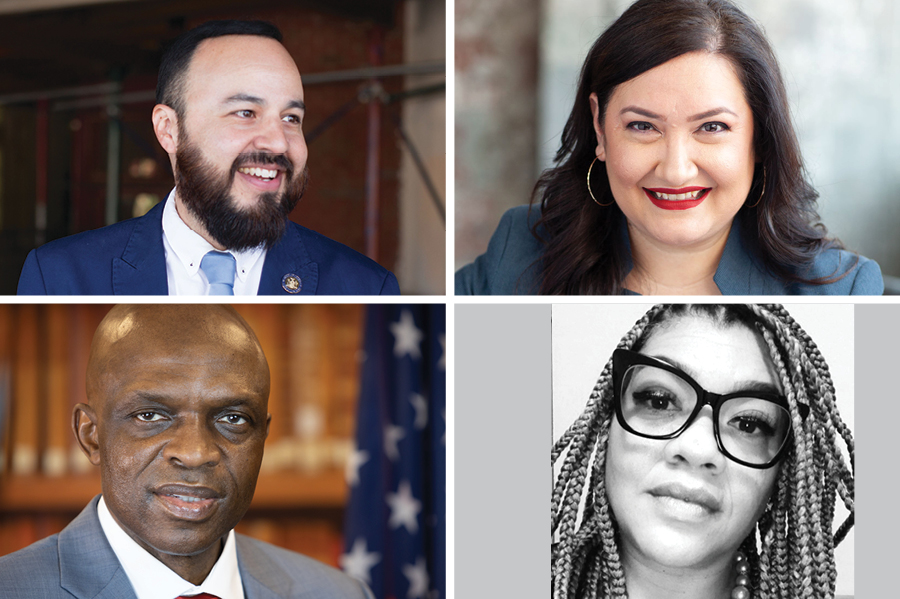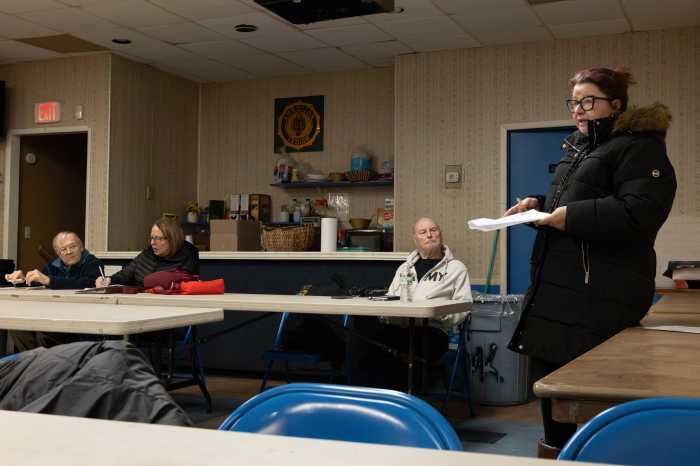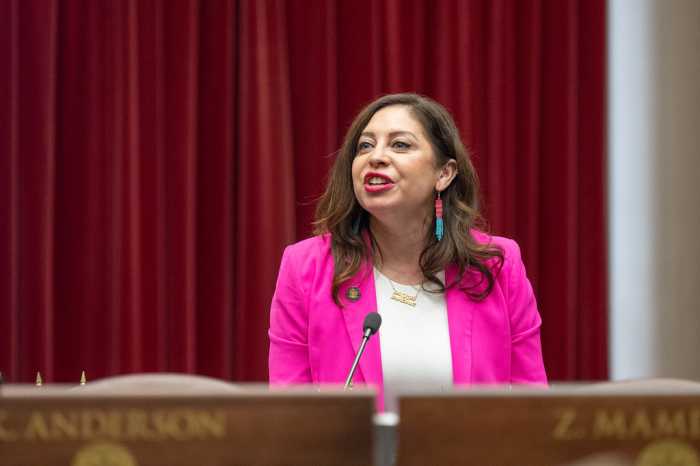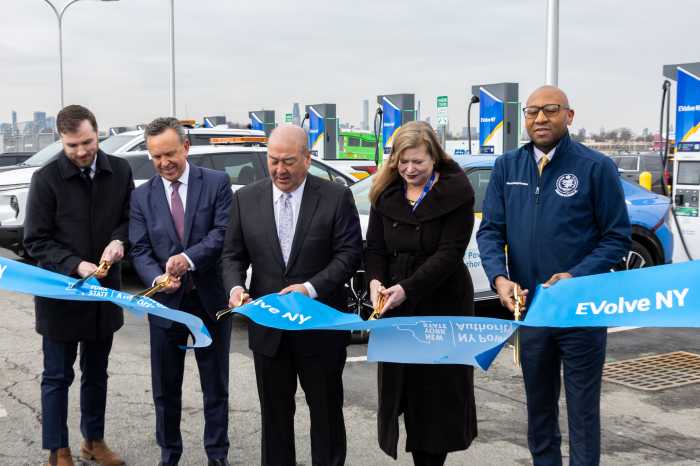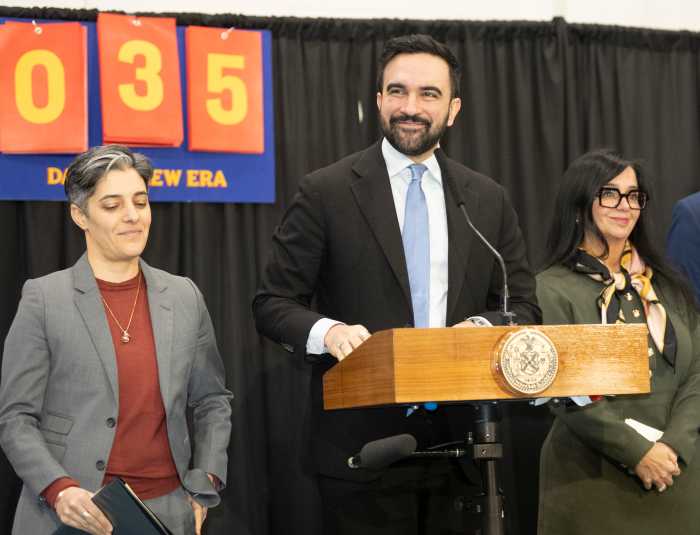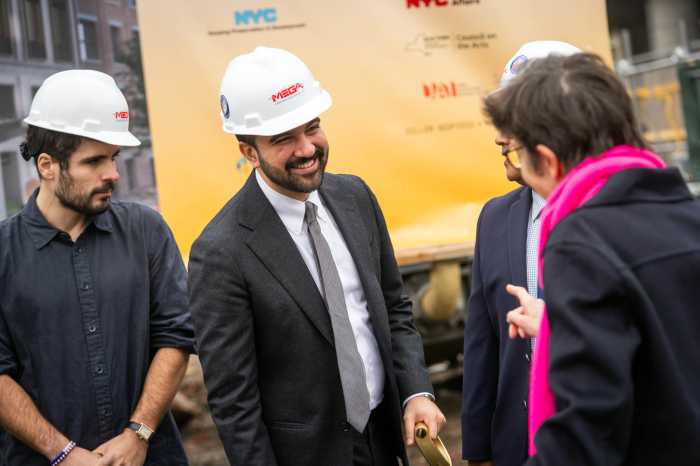There are six candidates running to represent District 21 in the City Council this year. The district — which encompasses the neighborhoods of East Elmhurst, Jackson Heights, and Corona, including Flushing Meadows Corona Park, Lefrak City and LaGuardia Airport — has been represented in the city’s legislative body by incumbent Francisco Moya since 2018.
Moya is running for reelection to continue serving his constituents in the district. The winner in November’s general election will represent a district facing several issues at the moment — increased testing and COVID-19 vaccination sites and affordable housing and protecting tenants’ rights — until 2023.
QNS sent five questions to each candidate running for the District 21 City Council seat, including David Aiken, Ingrid Gomez, Francisco Moya, Hiram Monserrate, George Onuorah and Talea Wufka.
See their responses, listed alphabetically, below.
Ingrid Gomez
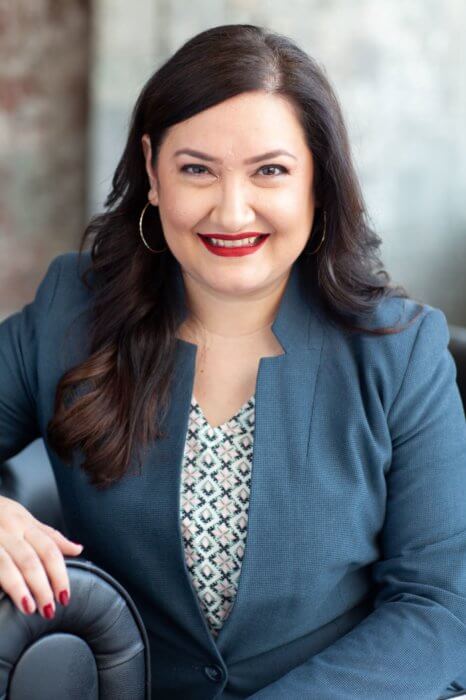
QNS: What, in your opinion, are the top three most pressing issues in your district?
Gomez: Housing affordability, food insecurity, and jobs. Essential workers typically earn minimum wage, and rents in our district are exorbitantly high making it nearly impossible for a family of three or four to pay these high rents. We will fight to build thousands of deeply affordable housing units in our district and provide good paying renewable infrastructure and manufacturing jobs in construction. For those who are still struggling to pay for basic necessities we will fight to provide a guaranteed minimum income for the most vulnerable New Yorkers which include many in my district who are living in poverty. We will also push for universal rent control and work with our colleagues in Albany to extend the rent-moratorium and to pass a progressive tax on the rich to fund excluded workers who don’t qualify for unemployment insurance.
QNS: What aspect of your background speaks best to your abilities as a City Council member?
Gomez: I’ve been a social worker for almost 18 years and have worked as an early childhood mental health therapist in my district for seven years at a Pre-K serving 3 y/o and 4 y/o children and their families. Given the social and economic inequities that exist in poor and working class communities of color like mine, who better than a social worker who understands these realities to represent their community in elected office? Social workers are uniquely poised to not only understand how systemic racism and poverty affect communities of color, but to also advocate for change at the micro and macro levels.
QNS: What do you love most about your district?
Gomez: I love so many things about my district, but what I love the most is the people who hail from all over the globe and speak dozens of languages. I love the diversity of foods–from the elote and tacos sold by street vendors in Corona Plaza, to the Peruvian ceviche at one of my favorite restaurants–Bravazo–which is right across the street from the LeFrak City Public Library. Like many of our community members, I am also an immigrant which helps me to better understand the unique struggles and challenges immigrants face.
QNS: Which one of your opponents will you be ranking second on your ballot and why?
Gomez: I haven’t really thought about this to be honest. I want to be my community’s number one choice.
QNS: In District 21, affordable housing and development are key issues. What work would you do, if elected, to solve this problem? How do you propose improving housing affordability?
Gomez: We will fight to build more deeply affordable housing in our district based on a different metric than is currently used which is AMI, the city’s metric based on the city’s average annual income which is higher than our district’s. We will use the average annual income for a family of three in our district to determine what rent the tenant will pay. We want to build more than 2,200 housing units at Willets Point, which is currently slated for only 1,100 units under the Mayor, Queens EDC’s and the incumbent’s proposals. The incumbent wants to bring a soccer stadium to Willets Point, while we want to build more deeply affordable housing in our community.
Francisco Moya
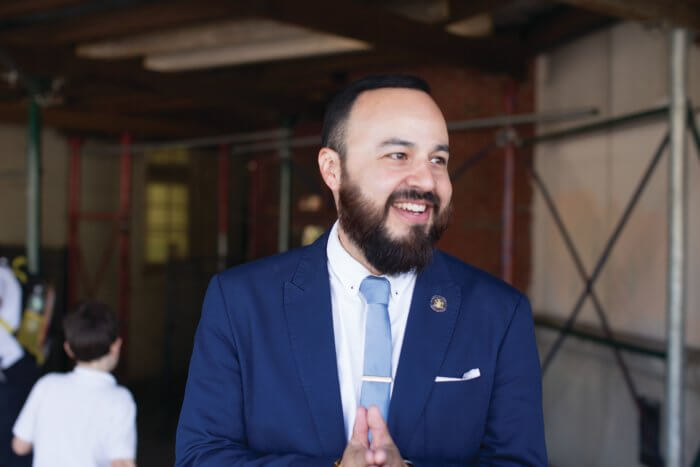
QNS: What, in your opinion, are the top three most pressing issues in your district?
Moya: Right now, three of the most pressing issues facing our community are the economic and public health devastation of the COVID-19 pandemic, affordable housing and workers’ rights. I have worked tirelessly throughout the pandemic to deliver for working families, fight for frontline workers, protect public schools, support our seniors, and ensure our community gets the resources we need. We must address these compounding crises in order to emerge from the pandemic stronger than when we went into it.
QNS: What aspect of your background speaks best to your abilities as a City Council member?
Moya: I was born and raised in Corona, the son of immigrants, and have been a dedicated community leader and activist for decades. I have deep roots in the community with a proven record of never backing down from a fight, and delivering results for my district. I continue to push for increased testing and vaccination sites in our neighborhoods, and to ensure that all New Yorkers get the same access to relief and resources. As a City Council member, and in my eight-year career in the State Assembly, I have consistently fought for working New Yorkers, stood up for youth and seniors, and delivered billions to our students and public schools. I’ve advocated for the rights of immigrants, writing the New York State Liberty Act, the Green Light Bill, the Dream Act, the Family Unification Act, and Carlos’ Law.
QNS: What do you love most about your district?
Moya: Its people, its diversity, its culture and its ya gotta believe attitude! After all, it helped elect the first Ecuadorian-American in the country. Also hands down the best ethnic food in all of the five boroughs.
QNS: Which one of your opponents will you be ranking second on your ballot and why?
Moya: There isn’t anyone that will bring a proven track record and continue to fight and deliver for my district and for the communities disproportionately impacted by this pandemic, and I won’t be ranking a second-choice on my ballot.
QNS: In District 21, affordable housing and development are key issues. What work would you do, if reelected, to solve this problem? How do you propose improving housing affordability?
Moya: In the City Council, I have written legislation to expand access to rental assistance, and used my position as Chair of the Subcommittee on Zoning and Franchise to institute studies on secondary displacement and push for affordable housing in neighborhood rezonings. I succeeded in securing 1,100 units of 100% deeply affordable housing in Willets Point after decades of failed attempts by previous leadership to use the land. During the pandemic, I have fought for the continuation of the eviction moratorium to protect tenants and have funded organizations that can assist and provide resources to New Yorkers facing eviction.
George Onuorah
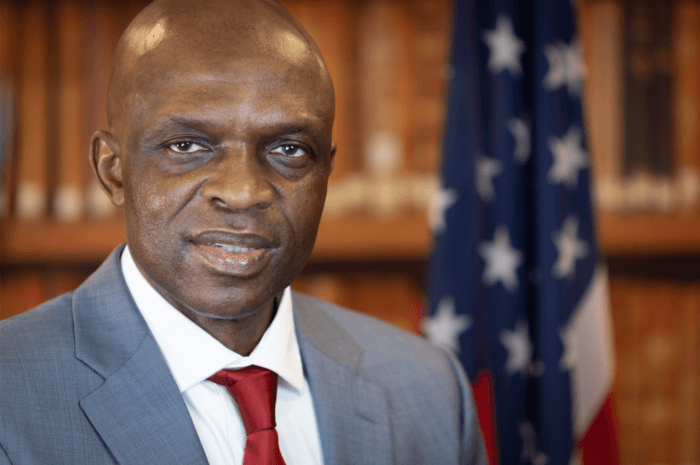
QNS: What, in your opinion, are the top three most pressing issues in your district?
Onuorah: The number one issue that remains high on my list of priorities is the COVID-19 pandemic that sadly continues to plague our state, our communities , and underserved neighborhoods in particular. Therefore, every single day we are doing everything in our power to alleviate the spread of the virus and keep district residents healthy and safe. We are focused on increasing testing and vaccination, educating small businesses about safety measures and helping them improve operations, despite all the setbacks. Another crucial issue is public safety, and we are here to protect residents from potential harassment, assault or hate crimes and make them feel as safe as possible, whether they are at home or outside.
QNS: What aspect of your background speaks best to your abilities as a City Council member?
Onuorah: As a Nigerian immigrant, I understand some of the struggles my constituents are going through, as well as their needs, aspirations and concerns. I grew up in a traditional household that places a high value on discipline, love, respect, responsibility and strong work ethic. I believe these are some of the most important attributes that will enable me to serve honestly and make a difference in people’s lives. At a time of great divide, I am determined to collaborate with my colleagues and collectively address the needs of our constituents.
QNS: What do you love most about your district?
Onuorah: I am excited to be part of the district that is arguably one of the most culturally diverse districts in the United States and possibly the whole world. It’s the exotic lifestyles, unique traditions, music, and foods from a wide variety of cultures, that energize me the most and give me the incentive to make things better for everyone who lives here.
QNS: Which one of your opponents will you be ranking second on your ballot and why?
Onuorah: Francisco Moya. As a legislator, I have often wondered why he has not been more assertive in advocating for the district to improve quality of life, some parts of Corona can use improved sanitation. When I am elected to serve the Council District 21, I will convene a meeting of community stakeholders and Department of Sanitation and even NYPD to see how we can strive for a better Queens. If this pandemic taught us anything, the importance of hygiene, building a healthy and a safe community remain quintessential.
QNS: In District 21, affordable housing and development are key issues. What work would you do, if elected, to solve this problem? How do you propose improving housing affordability?
Onuorah: The character of neighborhoods is rapidly changing as we see high rise buildings constantly springing up everywhere. Sadly, over-development is problematic and does not augur well for our communities. With the growing immigrant population in Corona, it is essential that we continue to fight for affordable housing and mitigate landlord’s ability to evict immigrants or tenants hit hard by this pandemic. I am looking to fight for tenants rights and being their advocate. I will take all the necessary steps to stop illegal eviction by an unscrupulous landlord and promote a friendlier tenant housing court that will not throw the book at tenants when their case is called to the court calendar.
Talea Wufka
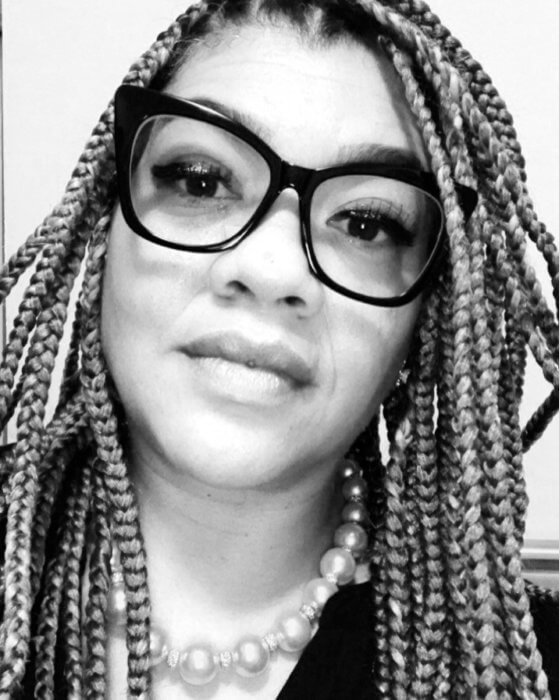
QNS: What, in your opinion, are the top three most pressing issues in your district?
Wufka: We need to invest in mobile mental health clinics. Due to this pandemic, to varying degrees we are all suffering from collective PTSD. People need a safe space they can just walk into and express their pain, concerns, issues and fears freely. The life we all knew has changed as we know it. Mental stability is a priority. In terms of housing justice and combatting homelessness, a shelter is not a home, it’s a prison cell without bars. Our district was targeted for 11 shelters and our Councilmember Moya just went along and did nothing to protect our community. We are in need of balance; Homeowners in East Elmhurst pay the highest property taxes in New York City. I intend on fighting for homeowners reducing their property taxes, lifting the burden on struggling working-class homeowners. Lastly, unity, without it, community is nothing.
QNS: What aspect of your background speaks best to your abilities as a City Council member?
Wufka: I’m biracial. Born and raised in the melting pot of the world. I grew up in the district and relate to the pains, struggles and changes in my district. I love people, I relate to them and view them as people. My passion is helping others. I am viewed as a problem solver. COVID-19 bought wrath and I am hands on, not at all afraid to lead people and be there to help them.
QNS: What do you love most about your district?
Wufka: What I love most about my district is the history and diversity. East Elmhurst was known for being the number 1 neighborhood in NYC and it was predominantly ethnic — It’s rich in history and the arts. Once home to Malcom X, Harry Belafonte, and right next-door Corona was home to Louis Armstrong. It has also been home to legends such as Kid and Play, DJ Polo and Kool J-Rap. Sadly, DJ Polos home went up in smoke on a cold winter night, inspiring my run, his mother looks like my mother and she was displaced and sent to a Bronx Shelter riddled with rats and cockroaches, when in her home district there are 12 shelters, why so?
QNS: Which one of your opponents will you be ranking second on your ballot and why?
Wufka: I will be ranking myself first; I know and love my district. I will rank choice for anyone but Moya — he has neglected this community for way too long, consumed with building a soccer stadium and developers. He is neither familiar nor in touch with the entire community as he has handpicked and chosen his circle, leaving most of his constituents in the dark. My number 2 pick would be Hiram Monserrate — I know him and his bond with my community. He’s a Democrat, a District Leader and we are in the middle of a crisis, lots are at stake and based on his knowledge, yeah, I would pick him second.
QNS: In District 21, affordable housing and development are key issues. What work would you do, if elected to solve this problem? How do you propose improving housing affordability?
Wufka: There must be direct investment by the City to build affordable housing. We have a $92 billion dollar budget. We can set aside part of that in every budget dedicated to affordable housing.
Candidates David Aiken and Hiram Monserrate did not respond before press time.

